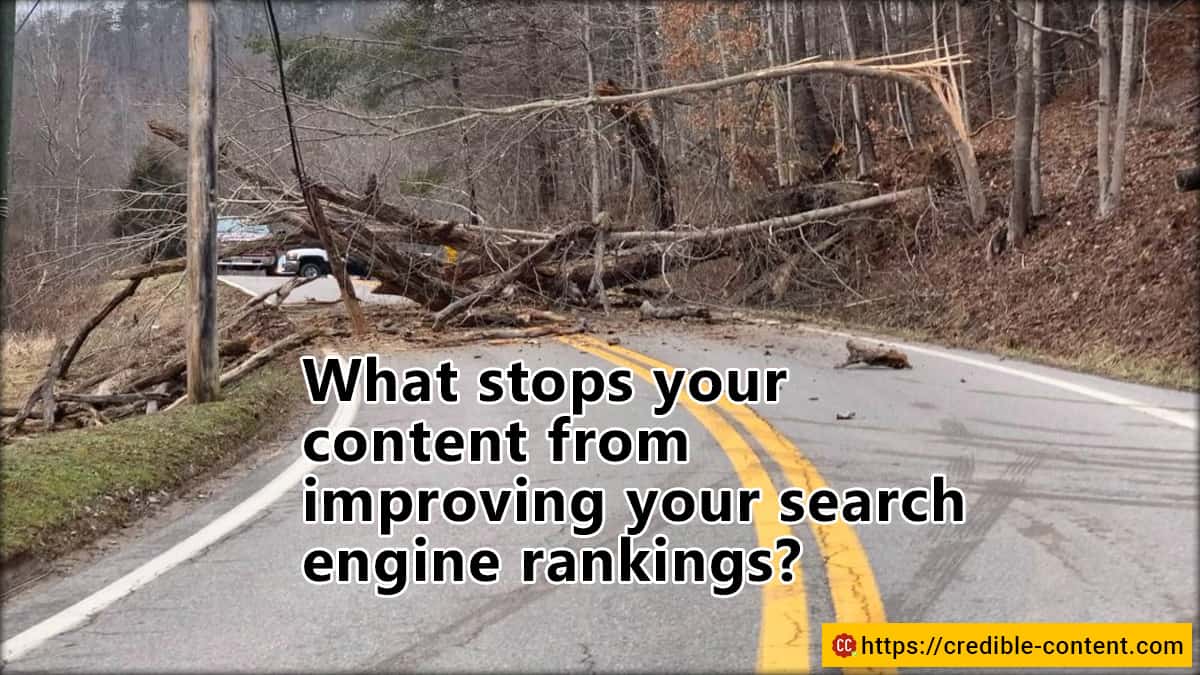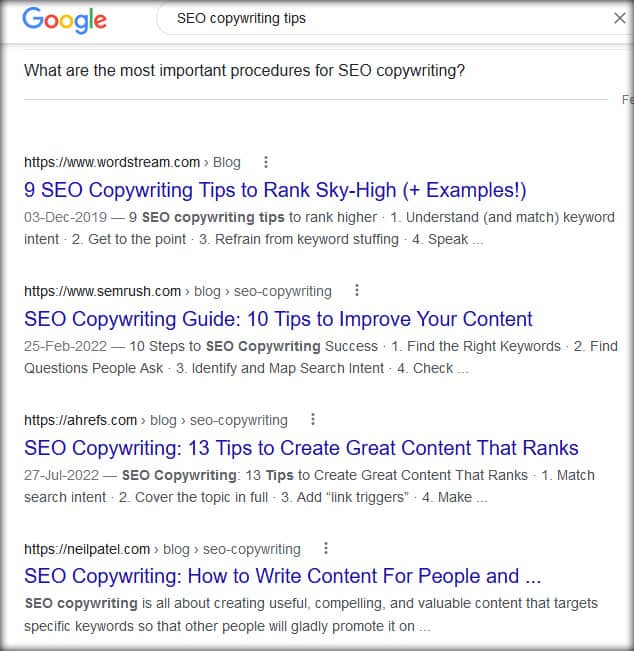Have you been posting content without much success with search engine rankings?
This can be frustrating.
Especially when you are putting in lots of effort and money into publishing high quality content on a regular basis.
How well your content ranks on search engines depends on multiple factors.
High-quality, relevant and engaging content is fundamental.
Without good content there can be no rankings.
Your search engine rankings depend on
- How much content you have already published.
- Your content publishing frequency.
- Your content publishing consistency.
- The niche of your content.
- The topics you have been covering.
- The relevance of your topics.
- Your click-through-rate on search engine listings.
- Your bounce rate.
- Search engine optimization level of your content.
- Social proof your website and individual links attract.
- The quality of incoming links from external websites.
- Internal linking of the content within your website or blog.
- How easy or difficult it is for the search engine crawlers to access your content.
- The age of your domain.
There are 200 odd factors that decide the search engine rankings of your content.
The factors that I have listed above are under your control.
There are many factors that are not under your control and they occur over a period of time, provided you keep publishing and promoting your content.
Nonetheless, how you write your content, how you choose your topics, and how you format your content, can have a significant bearing on your search engine rankings.
Over the years I have observed two types of problems that clients face:
- Less search engine traffic.
- Decent traffic but no business.
Less search engine traffic happens when content is not published regularly.
Decent traffic but no business happens when incorrect topics are chosen – topics that are not relevant to the target customers and clients.
Below I am listing a few reasons why your content may not be ranking well on search engines.
You are not choosing the topics your readers want
There is no direct connection between what you are publishing and what your readers are looking for.
This may result in your website attracting good traffic but not generating much business, or not generating traffic at all.
You need to have a clear idea of what people are searching for in relation with your business.
For my Credible Content blog I want to attract search engine traffic for the following topics
- Content writing
- Copywriting
- SEO copywriting
- SEO content writing
- Email marketing copywriting
- Social media marketing content writing
And such.
All my topics involved one of these expressions.
When you are writing content to improve your search engine rankings it is very important that in the topics you use the language and the expressions that are normally used by your target audience.
You are choosing topics that are too competitive
Are you writing on topics 25 other websites already rank on top?
It is normal tendency to want to write on topics that you are easily finding in search results thinking that they are in high demand.
Yes, they are in high demand, but many top-ranking websites have already occupied the top space for those topics.
Instead of going for very popular topics, use longtail keywords to come up with topics that are highly useful, but not very competitive.
For example, for me, it would be better to not write on “SEO copywriting tips”, but write on something like “10 SEO copywriting tips for beginners”.
I may attract fewer visitors, but at least, there is a chance I will get higher rankings for a less competitive title and there will be an audience for it.
You are not publishing content with greater frequency
This is important in the beginning when the Google search engine crawler hasn’t yet started crawling your website.
The crawling frequency depends on the frequency of content publishing.
The more often you publish, the greater is the frequency of the Google crawler.
If there is no routine, if you don’t publish content regularly, the crawler does not visit your website or blog regularly and hence your content is not included in the search engine index.
Even when it is included, it may take months before it can appear in search results.
So, what should be your content publishing frequency?
In the beginning, I would suggest, if your budget allows, two blog posts or web pages everyday.
I know, you may think it is too much, but if you want to improve your search engine rankings fast, then this is a good way to go.
Publishing twice and then submitting your URL to Google will get your content indexed faster.
You let Google know that your website is being updated with great frequency and hence, it should be crawled accordingly.
Once your content has begun to show up in search results, you can gradually reduce your frequency from two publications to one in a day.
It is recommended that you update your website at least 16 times every month even if you have good search engine traffic.
You are not using your keywords properly
How you use your keywords is very critical to the success of your search engine optimization campaign.
You need to use your keywords as exact phrase and as different parts.
Your main phrase must appear in the title of your web page or blog post.
For example, if I want to optimize my blog post for “SEO copywriting tips”, then this phrase must appear at least once in the title.
It can be a part of a bigger sentence or a bigger phrase, but it must be there.
Your main keyword must also appear within the first 100 words of your blog post, article, or web page.
There is a reason for that.
When search engine crawlers crawl your content, they may not get enough time to crawl the entire piece of content.
Midway they may leave for other sections of your website, or may even leave your website altogether.
Hence, use your main keyword in the beginning itself – this is because your main keyword represents the fundamental idea of what you are writing.
Without overusing, use different combinations of your main keyword (in my case, it would be “SEO”, “copywriting”, and “tips”) all over your text.
Use the exact phrase in some of the headings and subheadings.
If possible, also use the exact phrase at least once in bulleted points.
Also make sure you don’t over use your keyword.
In my case, instead of constantly using “SEO copywriting tips” I can use “writing tips”, “SEO writing”, “SEO tips” and “tips on SEO copywriting”.
With practice you learn to strike a balance.
You are publishing thin content
Most of the SEO experts recommend that your individual web pages and blog posts must be a 1000 words or more.
My blog posts average around 1000-1300 words.
Although Google considers less than 400 words as thin content, how many words you need depends on your competition.
If you run your longtail keyword through a tool like SEMRush it will tell you, based on your competitors, how many words your present blog post or web page must have to get a decent chance of ranking well.
Most of my clients ask for 800-1000 words, which is fine.
Personally, I believe, as long as you are publishing relevant content, there is no such thing as thin content.
Nonetheless, research has shown that the top 10 pieces of content that rank on Google, are more than 1000 words.
If, despite publishing regularly, your content is not ranking well, this could be one of the reasons.
For a couple of months, try publishing blog posts and web pages that are more than 1300 words.
Your Google click-through-ratio is low
Your search click-through-ratio is the number of times people click your link divided by the number of times your content appears in search results.
If, despite appearing in search results, fewer people are clicking your links, it tells the Google algorithm that the current rankings of your links are not solving their purpose, and as a result, your current rankings are lowered.
Therefore, despite the fact that sometimes your content is appearing in search results, just because people are not clicking your links, your rankings are lowered until they are way down the listings to be found.
Your bounce rate is high
I’m talking about the bounce rate in terms of traffic coming from search engines like Google.
Bounce rate means the number of people immediately leaving your website after finding your link on Google divided by the total number of people finding your link on Google, clicking it, and then coming to your website.
Google knows how much time people spend on your link once they find the link in search results.
If, after finding your link on search results and then clicking it, people hardly spend a few seconds on your web page or blog post, the Google algorithm assumes that your link doesn’t deserve its current rankings for the keyword it is showing up right now.
It assumes that the link does not have the information people are looking for, for the associated search term, and hence, your rankings are lowered.
These are a few factors that stop your content from ranking well on search engines.
There may be more factors that are directly in your control, or not in your control, but as far as your content goes, if you can take care of the above, you can significantly improve your search engine rankings.


